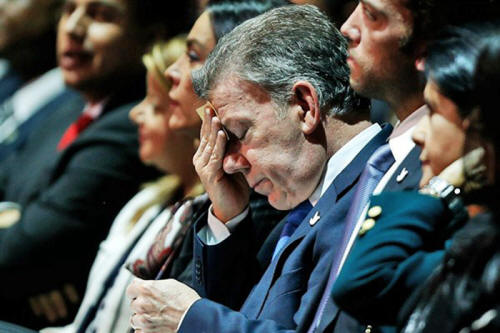|
from WorldPoliticsReview Website through GoogleCache
listens to Vice President German Vargas Lleras present an annual report in Bogota, March 14, 2017
(AP
photo by Fernando Vergara).
But when the Odebrecht case - a massive corruption scandal, possibly even the largest ever uncovered anywhere - burst onto the front pages of newspapers in nearly a dozen Latin American countries, it raised an important question:
The wrongdoing at Odebrecht, a Brazil-based engineering conglomerate that builds large-scale infrastructure projects, first came to the attention of Brazilian prosecutors back in 2014, as part of the investigation into corruption at Petrobras in the now infamous "Lava Jato," or car wash, case.
Details emerged gradually, but
the scandal soon took on gargantuan proportions, until the company
itself approached the U.S. Department of Justice seeking to work out
a global plea deal.
But by the time Washington became involved, Brazilian authorities had already dug up enough incriminating evidence to send the company's chief executive, Marcelo Odebrecht, to prison for 19 years.
Meanwhile, the scandal was rapidly spreading, which is why the company was eager to reach a settlement.
Last December, less than a month before a new administration took over in Washington, the Justice Department announced it had reached the largest settlement in its history.
Odebrechet and its affiliate
Braskem
agreed to pay $3.6 billion, most of it to Brazil. With that, the
lid was blown off the web of malfeasance woven by the firm.
...and others.
The corrupt structure that had
been developed in Brazil expanded, and over the course of 15 years
similar practices ensured the approval of projects and bids across
Latin America, securing billions in profits.
But while Petrobras may have been
Brazil's problem, Odebrecht morphed into a regional phenomenon.
In a moment of high drama, news reports claimed Toledo was on his way to Israel to seek asylum.
Israeli authorities announced he would not be allowed into the
country until he settled his affairs in Peru. The ex-president went
on social media to say he was not fleeing and declared his
innocence, while refusing to surrender.
Kuczynski, who was Toledo's finance minister, maintains he is completely innocent.
In a recent phone call with U.S. President Donald Trump, Kuczynski reportedly asked Trump to extradite Toledo from the United States.
The after-effect of this wave of prosecutionsis very likely to bea sharp decrease in corruption.
In Colombia, where President Juan Manuel Santos is fresh from winning the Nobel Peace Prize for negotiating a peace deal with the guerrilla group FARC, the entire political system is under pressure because of the new revelations.
Odebrecht, it turns out,
reportedly contributed millions of dollars to FARC chiefs, and
also helped finance Santos' re-election campaign as well as that of
his main opposition rival.
The list is
a 'who's who' of political and business figures, including Santos'
campaign manager, but not the president, who maintains he had no
knowledge of the graft.
Oscar Ivan Zuluaga, a former finance
minister and presidential candidate for former President Alvaro Uribe's party who ran against Santos in 2014, has been accused of
receiving $1.6 million in questionable campaign support.
Odebrecht's $2.04 billion bid
exceeded the maximum allowed and was higher than three others.
And yet it won the contract.
To some, the Odebrecht scandal may look like proof of a worsening epidemic.
But the evidence could suggest a more positive trend. By
this reading, the scandal is not a sign that there is more
corruption. On the contrary, it indicates that tolerance for
malfeasance is coming to an end.
Executives will think twice before risking such a fate. His firm, meanwhile, is in a nosedive, losing contracts by the day after two years of disastrous press.
Odebrecht says it will take at least 23 years to pay the fine. And it's not just Brazil where the rules are changing.
In Peru,
lawmakers have moved forward with constitutional reforms that end
the statute of limitations on corruption. That means that taking a
position in government as a path to riches is becoming a much
riskier proposition.
And while the U.S.
Justice Department did play a key role in providing information to
local prosecutors, the effort to punish the guilty and find ways to
uproot corruption is being pushed forward by individuals and
institutions in each affected country.
|


